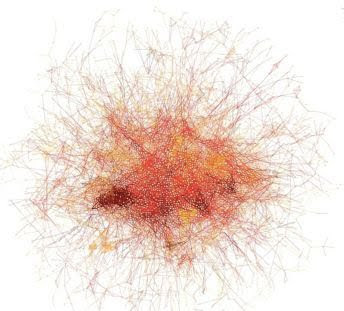
The big question for December 2009 was: “What did you learn about learning in 2009”. Well, just one very simple, yet essential thing: to open up and embrace sharing knowledge.
2009 was a very chaotic year for my blogging reflections. I just did not know where I was going and I had an existential blogging crisis. Reading all your blogs, I felt as though I just was not adding enough. All through 2009 I tried to stay on top of the new whirlwind of gadgets (new social media software, new mobile devices…), I dived into many papers and books on topics directly related to eLearning and mobile learning, but something was missing and I felt as though I was falling short.
However, there were two bright and clear actions that pushed my learning in 2009 and which brought me back to this earth and all its wonders.
The first actions that gave me a boost in 2009 were all your great ideas! During the presentations, the trainings and the workshops (online and face-to-face) I was able to give, I learned the most, although I was the one who was asked to take the lead. The participants and partners in these workshops, trainings and presentation settings were amazing. The participants always came up with great ideas, added relevant question marks, and paved the way to deeper understanding for us, the entire group. Thanks to you I now realize more than ever that trusting the team, and opening up to the network is what it is all about. It is about us, or quoting my favorite film by Miranda July, ‘Me You and Everyone We Know’: “We are all in this together.”
The other great beacon of inspiration, and a most humbling one, were all the health care workers I met in 2009 and with whom my colleagues and I tried to find solutions for their eLearning situations and challenges. Most of these health care workers work in dire conditions, in regions that only had a minimum of connectivity, sometimes war hurt regions, and despite these trying conditions they were happy with any exchange of knowledge that could take place. I learned a lot from all of them: keep it simple, share and connect. They also put my feet back on the ground: technology is an instrument connected to an economic class, it is the instrument of humans, and it is up to all of us to choose what we do with it. Those health care workers knew and know how important a network is. They know that the strength of any network can make the difference between life and death (district hospitals rely frequently on telemedicine to get answers to difficult cases). Technology enables those networks, but does not build or nourish them. So I respect every one of these health care workers immensely. They make a difference just by living, learning and connecting.
These networks gave a direction to a lot of my learning; they pushed my learning towards usefulness, and creativity. So in 2009 I learned that it is not the learning that I have gone through, but the learning we all could accomplish that makes the difference. This world is a wonderful place and human nature can be full of kindness and sharing. I am very glad I belong to this global network of people that want to learn, share and grow towards a better life for all. You all made me realize I cannot do it alone, but that it is okay, that together we can build on each other. My network is my strength, my beacon of light, my inspiration, so thanks to you all!





